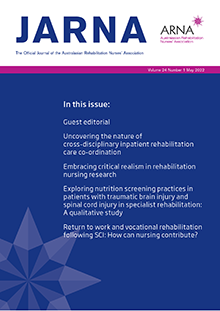Background Nutrition screening is paramount for the detection of malnutrition, allowing for improved patient care and timely nutrition management. Despite the well-documented prevalence of malnutrition in patients with traumatic brain injury (TBI) and spinal cord injury (SCI), no studies have assessed the validity of the malnutrition screening tool (MST) in these patient populations.
Objective The primary aim of this study was to explore health professionals’ perspectives on nutrition screening in patients with TBI and SCI in specialist inpatient rehabilitation. Furthermore, this study aimed to elucidate health professionals’ views on the barriers and enablers of nutrition management as directed by the MST score.
Methods Seven health professionals who used the MST in patients with TBI and SCI at a specialist rehabilitation centre participated in semi-structured, face-to-face interviews. Resultant transcripts were analysed thematically using the six-phase technique in QSR NVivo software.
Results Thematic analysis identified four main themes highlighting the barriers and enablers of the MST in patients with TBI and SCI: population-specific influencers (e.g., patient cognition and enteral feeding); the impact of the MST on staff resources; participant identification that additional resources were required to effectively administer the MST; and the importance of MST score-directed patient care.
Conclusions This study highlights challenges associated with the reliability of MST to direct nutrition care in patients with TBI and SCI, while recognising opportunities for improvement. This new knowledge underscores the importance of individualised patient care whilst identifying the need for sensitive, population-specific nutrition screening tools (NSTs).
